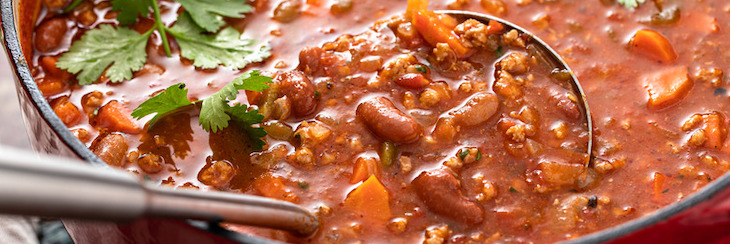These are the chili destinations you’ve got to visit!

Whether your mom mastered a multi-generational recipe, your community held chili cookoffs, or you frequented the Wendy’s drive-thru, your idea of chili probably stems from the version you grew up on. And if you hail from one of these chili-loving locations — Texas, Ohio, Indiana, Illinois, Oklahoma, Missouri, or New Mexico — your ideal chili likely looks different than your neighbors’ in other states. From ingredients to serving style, here’s what sets regional chili recipes apart.
Texas: Chili Con Carne
Chili con carne is the original chili. Call it Texas red, traditional red, or bowl of red, but don’t even think about adding beans if you want to cook chili like a true Texan.
Historians generally consider San Antonio, Texas, chili’s birthplace but can only speculate about how exactly the stew-like dish developed. We do know that it spread across the United States soon after it anchored a Texas exhibit at Chicago’s 1893 World’s Fair.

Key ingredients:Chopped or ground beef, tomatoes, chili peppers, paprika, cumin, and Mexican oregano
How it’s served: In a bowl, often with cheese and chopped raw onions sprinkled on top; eaten with corn bread or tortilla chips
Ohio: Cincinnati Chili
This isn’t Texas chili: Macedonian immigrants to Cincinnati came up with the recipe in the 1920s, drawing on the Mediterranean and Slavic influences of their home. What really sets Cincinnati chili apart, however, is serving as a topping over spaghetti. People also enjoy it over hot dogs, called coneys.

Key ingredients: Ground beef, tomato paste, cinnamon, nutmeg, cloves, allspice, chili powder, cumin, and (in some recipes) cacao powder
How it’s served: Served over spaghetti on a plate; order it “three-way” to add cheese, “four-way” to add cheese and beans or chopped raw onions, or “five-way” to add cheese, beans, and chopped raw onions; eaten with oyster crackers
Indiana: Hoosier Chili
Indiana’s brand of chili precedes Cincinnati’s iconic dish, as its first record dates back to 1908. Printed in an Indiana newspaper, this early recipe from a home cook lists spaghetti and a “10 cent piece of boiling beef” among its ingredients. Unlike Cincinnati chili, the Hoosier State’s version mixes spaghetti (or elbow macaroni) into the chili, and its consistency resembles soup.
Key ingredients: Ground beef, beans, tomato juice or V8, spaghetti or macaroni pasta, and chili powder
How it’s served: Served in a bowl; topped with shredded Cheddar; eaten with Frito chips

Illinois: Tavern Style Chili
From the opening of Springfield’s iconic Dew Chilli Parlor in 1909 through the 1910s and ’20s, the Illinois city saw the rise of several chili restaurants and tavern-style chili. Tavern chili, also called Springfield chili, differentiates itself with the use of beef suet. Cooking chili with this fat yields a layer of grease at the top of the pot. Locals don’t ditch the grease (dubbed oleo oil) but dip oyster crackers in it.
Key ingredients: Ground beef, beef suet or tallow, beans, tomato juice, chili powder, cumin, and (sometimes) beer
How it’s served: Served in a bowl; sometimes topped with shredded Cheddar and chopped raw onions; eaten with oyster crackers

Oklahoma: Oklahoma Chili
With attributes of Texan and the Midwestern chilis, Oklahoma chili speaks to the state’s place on the map. The average recipe calls for beans but otherwise resembles Texas red. And given the loose definition of what Oklahoma chili actually looks like, you’ll find plenty of variety in the Sooner State. For example, one Tulsa institution known for coney dogs has served its signature no-tomatoes, no-beans chili since 1926.
Key ingredients: Chopped or ground beef, beans, diced tomatoes, tomato sauce or paste, chili powder, cumin, and oregano
How it’s served: Served in a bowl with Frito chips and Cheddar; sometimes served as a topping for spaghetti or hot dogs

Missouri: Kansas City Chili
Kansas City doesn’t claim just one style of chili as its own. In this barbeque hub on the Kansas-Missouri border, pulled pork and the burnt ends of brisket can easily bulk up pots of chili. For recipes with ground beef, some cooks add oomph with a squirt of barbeque sauce.
For over a century, Dixon’s Famous Chili in Independence, the largest suburb on the Missouri side of Kansas City, has offered customers the option of extra meat juice or extra bean broth. Here, ketchup, pepper-infused vinegar, and spicy mustard are toppings as acceptable as shredded cheese. And with Missouri native President Harry S. Truman Truman as a former patron, Dixon’s chili has surely inspired home cooks.

Key ingredients: Ground beef and/or brisket or pork shoulder, beans, tomatoes, Worcestershire sauce, cumin, and chili powder
How it’s served: Served in a bowl; often topped with shredded Cheddar, sour cream, diced onions, or jalapeño relish; eaten with saltine crackers or corn bread
New Mexico: Chile Verde
Though chile verde hails from northern Mexico, there’s a sense of ownership of the dish across the border, too. In the southern New Mexico town of Hatch grows a green chile, the Hatch chile, that lends chile verde its spice and signature green color. Of course, people cooked with green chilis in the American southwest long before the land became part of the United States, and chile verde’s popularity across the region seems only natural.

Key ingredients: Chopped pork shoulder, green chiles, and garlic; optional add-ins include onions, cumin, Mexican oregano, and cilantro
How it’s served: Served in a bowl; eat with tortillas
- Related: History of Chili – Allrecipes
- Related: History of Chili – What’s Cooking America
